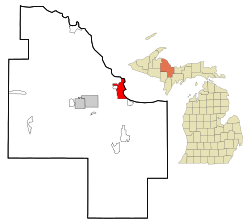Marquette, MI
| Marquette, Michigan | |
|---|---|
| City | |

Front Street in downtown Marquette, 1909
|
|
 Location of Marquette within Marquette County, Michigan |
|
| Location in the United States | |
| Coordinates: 46°32′47″N 87°24′24″W / 46.54639°N 87.40667°WCoordinates: 46°32′47″N 87°24′24″W / 46.54639°N 87.40667°W | |
| Country | United States |
| State | Michigan |
| County | Marquette |
| Government | |
| • Type | Commission-Manager |
| • Mayor | Dave Campana |
| • City Manager | L. Michael Angeli |
| Area | |
| • City | 19.45 sq mi (50.38 km2) |
| • Land | 11.39 sq mi (29.50 km2) |
| • Water | 8.06 sq mi (20.88 km2) |
| Elevation | 633 ft (203 m) |
| Population (2010) | |
| • City | 21,355 |
| • Estimate (2012) | 21,532 |
| • Density | 1,874.9/sq mi (723.9/km2) |
| • Metro | 67,077 |
| Time zone | EST (UTC-5) |
| • Summer (DST) | EDT (UTC-4) |
| ZIP code | 49855 |
| Area code(s) | 906 |
| FIPS code | 26-51900 |
| GNIS feature ID | 0631600 |
| Website | www |
Marquette is a city in the U.S. state of Michigan and the county seat of Marquette County. The population was 21,355 at the 2010 census, making it the most populated city of the Upper Peninsula. Marquette is a major port on Lake Superior, known primarily for shipping iron ore, and is the home of Northern Michigan University. In 2012, Marquette was listed among the 10 best places to retire in the U.S. by CBS MoneyWatch.
The land around Marquette was known to French missionaries of the early 17th century and the trappers of the early 19th century. Development of the area did not begin, however, until 1844, when William Burt and Jacob Houghton (the brother of geologist Douglass Houghton) discovered iron deposits near Teal Lake west of Marquette. In 1845, Jackson Mining Company, the first organized mining company in the region, was formed.
The village of Marquette began on September 14, 1849, with the formation of a second iron concern, the Marquette Iron Company. Three men participated in organizing the firm: Robert J. Graveraet, who had prospected the region for ore; Edward Clark, agent for Waterman A. Fisher of Worcester, Massachusetts, who financed the company, and Amos Rogers Harlow. The village was at first called New Worcester, with Harlow as the first postmaster. On August 21, 1850, the name was changed to honor Jacques Marquette, the French Jesuit missionary who had explored the region. A second post office, named Carp River, was opened on October 13, 1851 by Peter White, who had gone there with Graveraet at age 18. Harlow closed his post office in August 1852. The Marquette Iron Company failed, while its successor, the Cleveland Iron Mining Company, flourished and had the village platted in 1854. The plat was recorded by Peter White. White's office was renamed as Marquette in April 1856, and the village was incorporated in 1859. It was incorporated as a city in 1871.
...
Wikipedia

